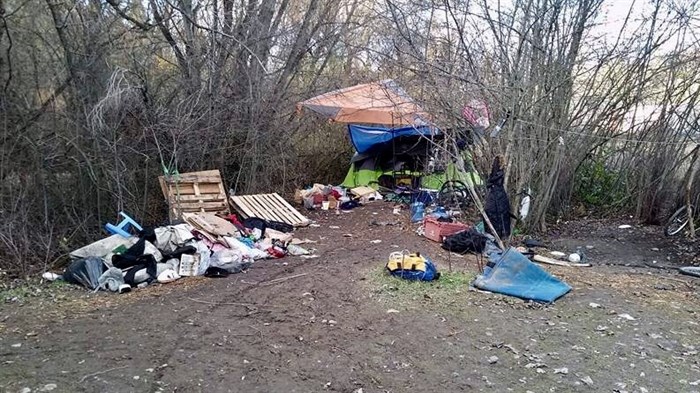
A homeless camp that was decommissioned in Vernon in November 2016.
Image Credit: City of Vernon
November 30, 2016 - 10:41 AM
VERNON - The camps may be gone, but Vernon’s issues with homelessness aren’t going away.
The city took steps this month to decommission large homeless camps in the areas of Polson Park and Kal Tire Place due to public safety and environmental concerns. But as the city’s manager of protective services Clint Kanester says, it won’t be long before people are camping outside again.
READ: Vernon homeless survey finds more people sleeping outside due to housing, wage issues
The number of homeless camps has been climbing steadily for the past two years, and the city has been trying to manage the situation for some time, Kanester says.
Earlier this year, Kanester requested a funding increase from Vernon council specifically to deal with homeless camps. The request was granted, and Kanester was able to establish two additional positions for a period of four months over the summer. The individuals worked Monday to Friday, spending roughly two to four hours in the camps every day.
“They were able to keep the camps clean, to make sure that if there were needles, that they were cleaned up,” Kanester says. “Through that program, the camps were kept fairly decent.”
Once the four months were up, Kanester says the camps ‘turned into a mess pretty quickly.’
In early November, a decision was made to decommission them due to unsanitary and unsafe conditions. Fires were occurring in tents, as well as materials hauled in to the camps, and there were a number of needles being found.
The city collaborated with social agencies to connect campers with shelter services, and Kanester says they made sure there were vacant beds when the camps closed. Thanks to B.C. Housing opening up its Extreme Weather Response Program earlier than normal, Kanester says there were enough beds available for everyone, although not all campers availed themselves of the services. That might be because they were banned from the shelter due to behavioural issues, because they don’t want to follow the rules, or because they fear personal belongings will be stolen there, Kanester says.
“There are multiple reasons,” he says.
What is clear is that homeless camps will start to pop up again, especially next spring and summer when the weather warms up and the extra bed mats provided through the Extreme Weather Response Program are no longer funded.
“At the end of the day, once those emergency shelter beds are gone again come April or May, people will start to move into those areas again and it will be very difficult for us to deal with it with existing staffing levels,” Kanester says.
He’s hoping Vernon council will approve the same four-month contract for additional staff, and says it would be beneficial to have those resources year-round.
“I do think, given the circumstances and the amount of issues going on in the community, it may make sense for council to extend the program. That, of course, is all dependent on funding and what council is willing to approve,” he says.
Kanester says it’s important to have a mechanism to provide at least some supervision and enforcement in homeless camps because municipalities are legally required to let people camp in parks if they have nowhere else to go.
“If you do not have shelter space in the community the courts have said you have to allow individuals to use public spaces for their safety and security,” Kanester says. “If that means having bylaw officers there making sure they’re cleaning up after themselves and perhaps providing garbage bags or porta-potties or something of that nature to ensure those individuals are not creating other hazards, then… it may be we have to look at that and have some funding.”
While camping in public parks is technically illegal in Vernon, Kanester says some other municipalities have modified their rules to allow camping in certain areas, during certain hours. Vernon may need to look at that going forward, Kanester says, noting a change like that would likely require additional funding for supervision of those areas.
Any funding have to be approved by council. Annual budget deliberations happen this week, and bylaw needs will likely be discussed during financial planning meetings Nov. 30 and Dec. 1.
Kanester — who works with social agencies in a group called the Camp Okanagan Outreach Liason (COOL) Team — adds that the root causes of homelessness, such as the lack of affordable and supported housing in the community, must also be addressed.
Social agencies and Vernon council have been calling on senior levels of government to provide more support for homelessness-related issues for years.
Because of its size, Vernon does not qualify for funding through Canada’s homelessness partnering strategy.
On Monday, Nov. 28, Vernon council approved a motion to give individuals five days notice when homeless camps are decommissioned. Camps will only be decommissioned if there is space available in local shelters. This process was already standard practice for Vernon bylaw, however council has now made it official.
There is also flexibility to provide more than five days notice depending on the circumstances.
To contact a reporter for this story, email Charlotte Helston or call 250-309-5230 or email the editor. You can also submit photos, videos or news tips to the newsroom and be entered to win a monthly prize draw.
We welcome your comments and opinions on our stories but play nice. We won't censor or delete comments unless they contain off-topic statements or links, unnecessary vulgarity, false facts, spam or obviously fake profiles. If you have any concerns about what you see in comments, email the editor in the link above.
News from © iNFOnews, 2016